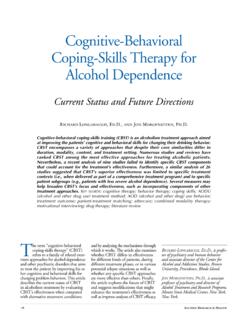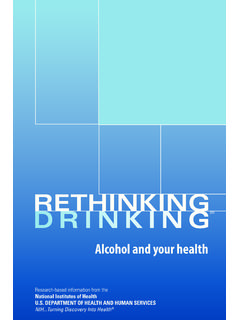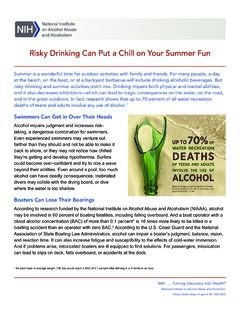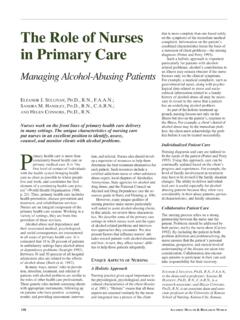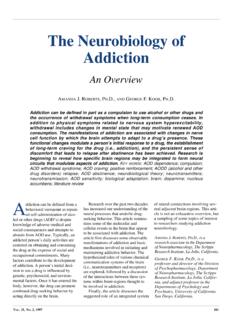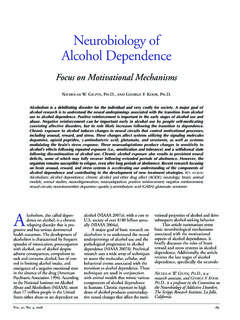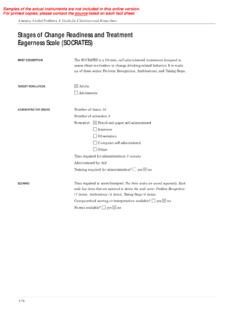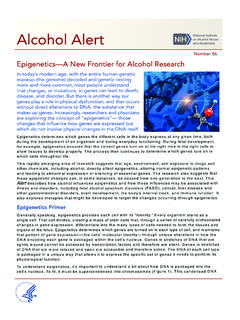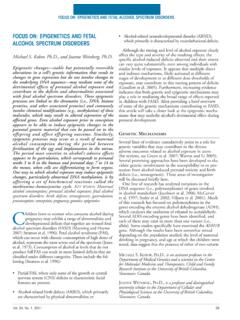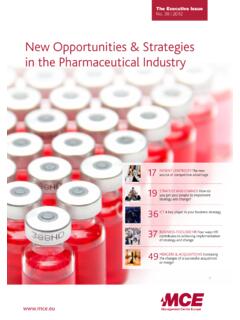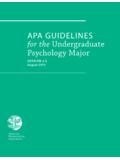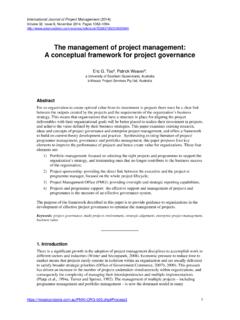Transcription of COGNITIVE- BEHAVIORAL COPING SKILLS THERAPY MANUAL
1 National Institute on Alcohol Abuse and Alcoholism Project MATCH Monograph Series Volume 3. COGNITIVE- BEHAVIORAL . COPING SKILLS . THERAPY . MANUAL . A Clinical Research Guide for Therapists Treating Individuals With Alcohol Abuse and Dependence Compiled and edited by: Ronald Kadden, Kathleen Carroll, Dennis Donovan, Ned Cooney, Peter Monti, David Abrams, Mark Litt, Reid Hester, Project MATCH Monograph Series Editor: Margaret E. Mattson, Department of Health and Human Services Public Health Service National Institutes of Health National Institute on Alcohol Abuse and Alcoholism 6000 Executive Boulevard Rockville, Maryland 20892-7003.
2 Project MATCH is supported by grants under a cooperative agreement funded by the National Institute on Alcohol Abuse and Alcoholism (NIAAA) and implemented by nine clinical research units and a data coordinating center. The project was initiated and is administered by the Treatment Research Branch, NIAAA. COPYRIGHT STATUS. This volume is adapted from copyrighted material that is reproduced herein with the permission of the copyright holders. Before reprinting any part, readers are advised to determine the copyright status and to secure permission of the copyright holders.
3 The authors would particularly like to thank Guilford Press for their kind permission to use extensive portions of the book Treating Alcohol Dependence: A COPING SKILLS Training Guide in the original version of the Project MATCH MANUAL and in the overview of this volume. The views and opinions expressed on the following pages are solely those of the authors and do not necessarily constitute an endorsement, real or implied, of the Institute or the Department of Health and Human Services. NIH Publication No. 94 3724. Reprinted 2003. Acknowledgments Project MATCH Research Group and Other Contributors Principal and William Miller, Coinvestigators Reid Hester, Center on Alcoholism, Substance Abuse and Addictions at the Sites University of New Mexico Albuquerque, NM.
4 Gerard Connors, Robert Rychtarik, Research Institute on Alcoholism Buffalo, NY. Carrie Randall, Raymond Anton, Medical University of South Carolina and Veterans Administration Medical Center Charleston, SC. Ronald Kadden, Ned Cooney, University of Connecticut School of Medicine Farmington, CT. Carlo DiClemente, Joseph Carbonari, University of Houston Houston, TX. Allen Zweben, DSW. University of Wisconsin-Milwaukee Milwaukee, WI. Richard Longabaugh, Robert Stout, Brown University Providence, RI. iii Cognitive- BEHAVIORAL COPING SKILLS THERAPY MANUAL Dale Walker, Dennis Donovan, University of Washington and Seattle VA Medical Center Seattle, WA.
5 Coordinating Thomas Babor, Center Frances Del Boca, Principal and University of Connecticut Farmington, CT. Coinvestigators Kathleen Carroll, Bruce Rounsaville, Yale University New Haven, CT. Contributing Peter Monti, Authors David Abrams, Butler Hospital/Brown University Providence, RI. Mark Litt, University of Connecticut Health Center Farmington, CT. NIAAA Staff John Allen, Project Officer for Project MATCH. Chief, Treatment Research Branch Margaret Mattson, Staff Collaborator for Project MATCH. Cooperative Lisa Marshall Education Gallaudet University Washington, DC.
6 Program Consultants Larry Muenz, Gaithersburg, MD. Philip Wirtz, George Washington University Washington, DC. Contractor Jane K. Myers President Janus Associates Bethesda, MD. iv Foreword A major focus of the efforts of the National Institute on Alcohol Abuse and Alcoholism (NIAAA) in treatment research is to rigorously test the patient-treatment matching approach to the clinical management of alcoholism. This commitment is particularly reflected in its multi-site clinical trial, Project MATCH. This study is the first national, multisite trial of patient-treatment matching and one of the two largest current initiatives of NIAAA.
7 Established under a cooperative agreement that allows direct collaboration between the Institute and the researcher, the project involves nine geographically representative clinical sites and a data coordinating center. Researchers in Project MATCH are among the most senior and experienced treatment scientists in the field. Both public and private treatment facilities, as well as hospital and university outpatient facilities, are represented. The manuals in this series are the result of the collaborative efforts of the Project MATCH investigators and are used as guides by therapists in the trial.
8 They are presented to the alcohol research community as standardized, well-documented intervention tools for alcoholism treat- ment research. The final reports of Project MATCH will inform us on the relative efficacy of the interventions being evaluated in the trial and on the types of clients who benefit the most from each of the therapies. Until the final results from Project MATCH are presented to the com- munity, these interim manuals will summarize the consensus of the investigators on reasonable intervention approaches based on present knowledge.
9 We look forward to offering further refinements of these approaches as Project MATCH data are analyzed and published and as the alcohol treatment field advances through the efforts of other ongo- ing research. Enoch Gordis, Director National Institute on Alcohol Abuse and Alcoholism v Preface This MANUAL for therapists is provided to the public to permit repli- cation of the treatment procedures employed in Project MATCH, a multisite clinical trial of patient-treatment matching sponsored by the National Institute on Alcohol Abuse and Alcoholism (NIAAA).
10 It describes Cognitive- BEHAVIORAL COPING SKILLS THERAPY (CBT), one of three treatment approaches studied in Project MATCH. Therapist man- uals for the other treatments Twelve-Step Facilitation THERAPY (TSF). and Motivational Enhancement THERAPY (MET) are available in vol- umes 1 and 2 of this series, respectively. Rationale for Although a number of therapies have had varying degrees of success, Patient- no single treatment has been shown to be effective for all individuals diagnosed with alcohol abuse or dependence. In recent years, interest Treatment in the field has increasingly focused on patient-treatment matching to Matching improve outcome.
